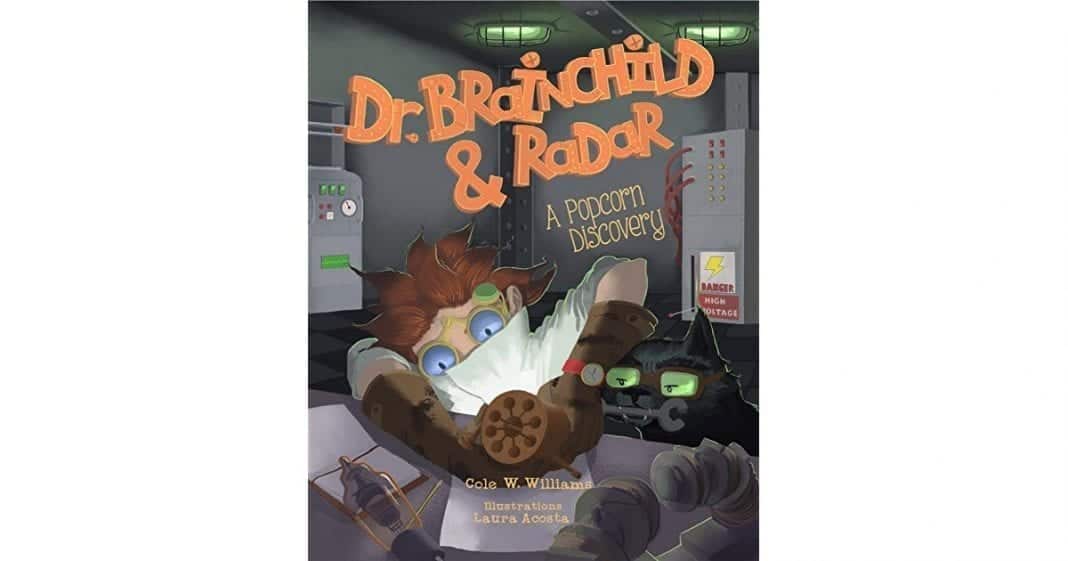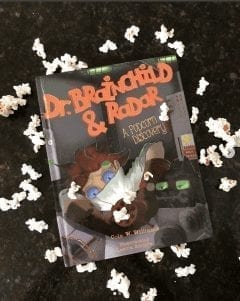
Homeschooling kids can be fun but it can also be frustrating, especially when teacher mom is a science nerd but pupil son couldn’t be less interested. That’s why a book such as Dr. Brainchild & Radar: A Popcorn Discovery is such an excellent addition to our library.
If I asked our son if he would like to learn how a microwave oven works I would be met with about as much enthusiasm as I have for rewatching the episodes of his favourite shows for the 789th time.
However, ask him if he would like to read a story and make some microwave popcorn, and suddenly he is a captive audience. That’s where the eccentric Dr.Brainchild and trusty canine sidekick Radar come in.
Dr. Brainchild is an inventor who has a dog named Radar. Each day the dynamic duo head on over to the lab, where Dr. Brainchild is working on the “Magnetron.”
Dr. Brainchild, in possession of a delicious chocolate bar, pockets the tasty confection instead of eating it. Then, when standing too close to the Magnetron, a pocket full of sticky liquid coca leads to a eureka moment that leads to the invention of the microwave.
Popcorn kernels are used to test Dr. Brainchilds theories about radiation waves heating the food, an experiment you can easily recreate in your own kitchen. Just keep your fingers crossed that your kitchen doesn’t end up like Dr. Brainchilds lab!
The final page of the book provides some factual information about the invention of the microwave and a website where kids can go for further details. This gave me the chance to further engage son #3 before he had the chance to get away.
Join the fun as Dr. Brainchild and Radar discover how a little bit of creativity, some wacky inventions, and a whole lotta science can transform the ordinary into something EXTRA tasty! Boy, girl, wolf, or anything in-between–it doesn’t matter so long as YOU are there! Science is for everyone, so come along and enjoy the ride!
An Interview with Cole W. Williams
When did you know you wanted to be a writer?
I spent a lot of my life wondering what I should “be,” this question largely being generated by the American education system with a pre-selected bevy of choices. The idea of choosing one thing plagued me, I wanted the freedom to go where my wings and wind invite and with writing I can do this.
For a while, I figured I should be a scientist and science writer, but kept making up stories in my head of the model we were studying at any particular time and personifying it, exaggerating it. As a result of that story-making, I was able to get others really excited about something they had never thought of that way before, “What do you think a Tardigrade does for fun?”
In general, writing was less of a knowing per say, and more of a propulsion from another dimension, so as a kid, I registered for poetry camps and wrote in journals, made up stories with my friends, it has always spewed forth unsolicited. Figuring out what to do with all that requires skill and the ability to trust in literary professionals. I have always loved everything about the literary arts: reading, writing, creation, stories, smells of books, magic of books.
Why do you think it’s important to present scientific topics to kids in a fun way?
There is an immediate shut down in some kids, triggered by certain words, and it happens at a young age. How shocking to hear a child say they are not “good at” science or math or ping-pong. A-what? How long does it take to give something a fair shake?
This idea comes from somewhere else, from permission to not try, not challenge oneself to have the patience for deep learning. I think this comes from mainstream marketing. What’s easy and makes a quick buck is prioritized to sell. It is getting better with the STEM movement. I think parents that read to their children are wanting more and so are the children themselves.
For many
It is unfortunate if these stories can’t be shared because of the lack of diversity in publishing and delivery modus. Writing science in fun ways takes some of the pressure off the learner, not to the point that they are not connecting to the topic but enough so that they can stick with it.
How is writing a kids’ book different than other projects you’ve worked on?
Writing a picture book is very different than any other book I’ve written. In fact, I was in a session at the Minnesota Writers Conference on creating picture books and the speaker said, “Picture books are the most difficult books to make, don’t believe me? Try it.” That is all it took to get me interested in taking the challenge and I am on the other side now, coming to you to report that I think she was spot on.
It’s hard to explain. It is sort of like writing haiku. Take an idea and distill it down until there are hardly any words left
What is the process like to collaborate with an illustrator?
This is by far my favorite part of creating a book. I adore seeing an artist free to express words with how they see the story. It is magical to get a file for the first time with new sketches. It is such a beautiful marriage of art; writer with illustrator. I could live in that part of the process.
Did your kids have input on Dr. Brainchild?
Believe it or not, no. I follow Stephen King’s advice with the
Was Radar inspired by a real dog?
When I was researching for Dr. Brainchild, I found it unavoidable to ignore the connection between war-time and technologically advancements, laudable discoveries that were happenstances of researching war devices. Radar represents this presence in these labs. He was meant to be a dark figure in the halls of the labs, silent but always there. Originally he was more sinister but I could not resist the companionship between the two characters. Maybe in future
Why did you choose to focus on the microwave?
Because the Magnetron is one of the most exquisite inventions created and this is what is at the center of all microwaves. The fact that each home has a microwave with this level of sophisticated machinery in it is a minor miracle of human invention, and there are more!
Start asking yourself how things actually work or what was required to make something streamlined, it gets fascinating, like building an old BMW motorcycle from scratch–exquisite.
What’s next for you?
Currently obsessed with haiku. I have been writing this form for a couple months and am about to challenge myself to write one haiku for every word in the Japanese Nature Dictionary.
I am teaching poetry and hosting other classes at Creators Space in St. Paul including my Banned Book Club, The Hearty Book Club, Embracing Beginner class and more. I have one novel







